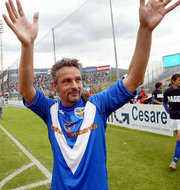

Roberto Baggio (born February 18, 1967 in Caldogno, Italy) is an Italian
football player, considered to be among the best forwards in the
world throughout the 1990s. In 1993, he was named both European Footballer
of the Year and World Player of the Year.
|
Baggio started his career with Vicenza in Serie C1 in 1981. Fiorentina
snapped him up in 1985, and during his years there, he rose to cult
status among the team's fans. He was sold to Juventus amid large
fan outcry in 1990 for $19 million, the world record transfer for
a football player at the time. That year, he played in his first
World Cup although he then only showed flashes of his brilliance
in that tournament. In 1993, he got his lone European club hardware,
helping Juventus to the UEFA Cup.
Roberto was the cornerstone of the Italian team during the 1994 World Cup, leading them to the final. He scored five goals, all in the medal round: two in the Round of 16 to beat Nigeria, a late winner in the quarterfinals to top Spain, and two to beat Bulgaria on the semifinals. Unfortunately, Baggio was not fully fit against for the final against Brazil, and missed Italy's last penalty (Brazil still had a kick left) as the South Americans won the World Cup title after a 0-0 tie. However it is often overlooked that two other Italians, Franco Baresi and Daniele Massaro, had already missed penalties and had Baggio scored, Brazil would have still had a penalty to win the Cup nevertheless.
He won his first scudetto with Juventus in 1995, who promptly sold him to A.C. Milan, where he won his second scudetto a year later. At the Milan club, he was frequently at odds with then chairman Silvio Berlusconi who was once an admirer of Baggio and had declared that he was never a fan of Baggio's dreadlocks but if the striker kept scoring goals at a prodigious rate for the club, Berlusconi would not even bother to care about Baggio's fashion statement. In 1997, when he thought to be on the downslide, Baggio transferred to Bologna in order to resuscitate his career, and after scoring a personal best 22 goals that year, was named to Italy's squad for the 1998 World Cup in place of hotly favored Gianfranco Zola, a decision by then coach Cesare Maldini which did not meet with Italy football fans' approval. He scored two goals - one from the spot against Chile - and added one in the penalty shootout as Italy went out to eventual champions France. He was thought to be one of Italy's main contributors of that tournament, the other being Christian Vieri in a team full of talent but little in terms of flair and attacking prowess and also known for playing dour and boring football.
After the World Cup, Baggio signed with Internazionale but this proved to be an unfortunate move, as the then coach Marcello Lippi did not favour Roberto and hardly played him, preferring to play Ronaldo up front. That led Baggio to lose him his place with national team. After two years with Inter, he transferred to previously unfashionable Brescia, playing there until his retirement in 2004. Baggio finished his career with 203 goals in Serie A, and 56 caps and 27 goals for the national team. He was given a sendoff match on April 28, 2004 against Spain.
Baggio played one last match, the Football for Hope tsunami relief match at the Nou Camp in Barcelona, on February 15, 2005.
Baggio is known as Codino Divino (Divine Ponytail), for the hairstyle
he kept for most of his career. He is a devout Buddhist, a rarity for
an Italian.
Clubs
- Vicenza (1981 - 1985) (played in 36 matches and scored 13 goals)
- Fiorentina (1985 - 1990) (94 matches, 39 goals)
- Juventus (1990 - 1995) (141 matches, 78 goals)
- A.C. Milan (1995 - 1997) (51 matches, 12 goals)
- Bologna (1997 - 1998) (30 matches, 22 goals)
- Internazionale (1998 - 2000) (41 matches, 9 goals)
- Brescia (2000 - 2004) (95 matches, 43 goals)
Honours
- Serie A champion: 1995, 1996
- Italian cup: 1995
- UEFA Cup: 1993
- European Footballer of the Year: 1993
- FIFA World Player of the Year: 1993